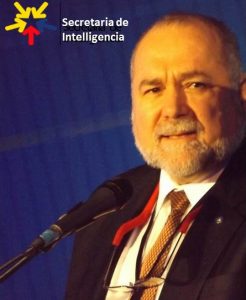
The United States Needs an Information Warfare Command: A Historical Examination
Conrad Crane
War on the Rocks
At its core, information warfare is about gathering, providing, and denying information in order to improve one’s own decision-making while damaging the enemy’s.
 ROBERT STEELE: Cyber-Command is a complete failure. The US Government chose to ignore my 1994 warning letter, with three co-signers, and we have since that time focused on mass surveillance, very expensive collection and very inadequate processing, and “at best” 4% intelligence (decision-support). I wrote the original book on INFORMATION OPERATIONS and consider it a testament that most brain-dead Colonels that have read it, hate it. We suck at intelligence and we suck at information operations. We are simply not serious. Cyber-Command could, perhaps be saved (just as the secret intelligence community could be saved) but probably not in the near term. The first step toward fixing both cyber and IO as well as intelligence, is the creation of an Open Source Agency (OSA) twice approved by the Office of Management and Budget (OMB) at $125M IOC toward $2B FOC. Absent that initiative, we will continue to fail.
ROBERT STEELE: Cyber-Command is a complete failure. The US Government chose to ignore my 1994 warning letter, with three co-signers, and we have since that time focused on mass surveillance, very expensive collection and very inadequate processing, and “at best” 4% intelligence (decision-support). I wrote the original book on INFORMATION OPERATIONS and consider it a testament that most brain-dead Colonels that have read it, hate it. We suck at intelligence and we suck at information operations. We are simply not serious. Cyber-Command could, perhaps be saved (just as the secret intelligence community could be saved) but probably not in the near term. The first step toward fixing both cyber and IO as well as intelligence, is the creation of an Open Source Agency (OSA) twice approved by the Office of Management and Budget (OMB) at $125M IOC toward $2B FOC. Absent that initiative, we will continue to fail.
Here is the village idiot's guide to IO:
Interventionist IO promulgates unilateralist lies and seeks to achieve a short-term gain for one party at great expense to other parties. Attentive IO seeks multi-cultural truths that radically reduce costs while creating “a prosperous world at peace, a world that works for all.” Attentive IO is rooted in a “win-win” perspective and an understanding that “the truth at any cost lowers all others costs.”
● Interventionist IO: false flag operations, paid media assets, agents of influence who lie to their own governments (John Bolton working for Israel, John Brennan working for Saudi Arabia, would be two American examples), funded false testimony to Congress (Kuwait Ambassador’s daughter lying about seeing Iraqis throw babies from incubators), outright blackmail (Jeffrey Epstein and pedophilia), outright bribery (Zionist billionaires funding Chuck Schumer, John McCain, Lindsey Graham among many others).
● Attentive IO: strategic communication & public diplomacy; peacekeeping intelligence & information peacekeeping; early warning & stabilization-reconstruction operations; homeland defense & civil support; national education & national research; acquisition & logistics.
Put most simply, Interventionist IO is for traitors who are not being held accountable for results who seek only to spend vast amounts of money to achieve short-term results favoring the Deep State and its Zionist underbelly (in Russia this would be new oligarchs funded by CIA’s Gold War and Russian Jews of convenience with criminal tendencies), while Attentive IO is for patriotic strategic thinkers playing the long game.
I will point out in passing that until we can do honest comprehensive decision-support for strategy, force structure, and acqusition, DoD will continue to be 50% waste and unable to win wars. General Al Gray created the Marine Corps Intelligence Activity (MCIA), of which I was the founding senior civilian, to do what no one else in defense intelligence was doing. I left — resigned — in 1993 — in part because it was clear that MCIA would not be allowed to do its job. I nearly got fired over briefing Congressional staff on why the M1A1 was the stupidest possible option for an expeditionary force; and nearly got fired again for briefing the joint USN-USMC force structure board on why we needed to give up three carriers to get to a 450 small and mid-size ship Navy that was 33% amphibious/littoral instead of 9%.
The US Government cannot handle the truth. The US Government does not want to know the truth. Until we implement #UNRIG (election reform) we will not be able to do honest strategy, force structure, and acquisition. We can however begin the process of internal healing. As General Mark Milley contemplates his forthcoming elevation to be Chairman of the Joint Chiefs of Staff, he might consider the value of an OSA, started now, that will allow him to be the first C/JCS actually able to call on intelligence at all four levels of analysis (strategic, operational, tactical, technical), and thus able to completely restructure DoD while cutting its cost in half.
References:
Steele, Robert with James Anderson, William Caelli, and Winn Schwartau, “Correspondence, Sounding the Alarm on Cyber Security,” McLean, VA: Open Source Solutions, Inc., August 23, 1994.
Steele, Robert. “Creating a Smart Nation: Strategy, Policy, Intelligence, & Information,” in Alan Campen, Douglas Dearth, and R. Thomas Gooden (eds.), Cyberwar: Security, Strategy and Conflict in the Information Age, Fairfax, VA: Armed Forces Communications and Electronics Association, 1996, pp. 77-90.
Steele, Robert. “Information Peacekeeping: The Purest Form of War,” in Lloyd J. Mathews (ed.), Challenging the United States Symmetrically and Asymmetrically: Can America be Defeated, Carlisle, PA: Strategic Studies Institute, U.S. Army War College Press, pp. 143-171.
Steele, Robert. “Takedown: Targets, Tools, and Technocracy,” in Lloyd J. Matthews (ed.), Challenging the United States Symetrically and Asymmetrically: Can America Be Defeated? Carlisle, PA: Strategic Studies Institute, U.S. Army War College Press, 1998, pp. 117-141.
Steele, Robert. “Presidential Leadership and National Security Policy Making,” in Douglas T. Stuart (ed.), Organizing for National Security, Carlisle, PA: Strategic Studies Institute, U.S. Army War College Press, 2000, Chapter 12, pp. 245-282.
Steele, Robert. “Threats, Strategy, and Force Structure: An Alternative Paradigm for National Security,” in Steven Metz (ed.), Revising the Two MTW Force Shaping Paradigm, Carlisle, PA: Strategic Studies Institute, U.S. Army War College Press, 2001, Chapter 9, pp. 139-163.
Steele, Robert (2001). On Intelligence: Spies and Secrecy in an Open World, Open Source Solutions, Inc., November 22, 2001. 495 pages.
Steele, Robert. The New Craft of Intelligence: Achieving Asymmetric Advantage in the Face of Nontraditional Threats, Carlisle, PA: Strategic Studies Institute, U.S. Army War College, Press, February 1, 2002.
Steele, Robert (2002). The New Craft of Intelligence: Personal, Public, & Political–Citizen’s Action Handbook for Fighting Terrorism, Genocide, Disease, Toxic Bombs, & Corruption, Open Source Solutions, Inc., April 8, 2002.
Steele, Robert (2006). Information Operations: All Information, All Languages, All the Time, Open Source Solutions, Inc., January 30, 2006. 362 pages.
Steele, Robert, Ben de Jong and Wies Platje (eds.) (2003). Peacekeeping Intelligence: Emerging Concepts for the Future, Open Source Solutions, Inc., May 15, 2003. 532 pages.
Steele, Robert (2006). The Smart Nation Act: Public Intelligence in the Public Interest, Open Source Solutions, Inc., September 11, 2006. 250 pages.
Steele, Robert. Information Operations: Putting the “I” Back Into DIME, Carlisle, PA: Strategic Studies Institute, U.S. Army War College, Press, February 1, 2006.
Steele, Robert. “Open Source Intelligence (Strategic),” in Loch Johnson (ed.), Strategic Intelligence: The Intelligence Cycle, Westport, CT: Praeger, 2007, Chapter 6, pp. 96-122.
Tovey, Mark with Robert Steele, eds. (2008). Collective Intelligence: Creating A Prosperous World at Peace, Earth Intelligence Network., March 19, 2008. 648 pages.
Steele, Robert, “Intelligence for the President–AND Everyone Else,” CounterPunch, 1 March 2009.
Steele, Robert. Human Intelligence: All Humans, All Minds, All the Time, Carlisle, PA: Strategic Studies Institute, U.S. Army War College, Press, June 3, 2010.
Steele, Robert (2010). Intelligence for Earth: Clarity, Diversity, Integrity, & Sustainability, Earth Intelligence Network, January 20, 2010. 288 pages.
Steele, Robert. “The Ultimate Hack: Re-Inventing Intelligence to Re-Engineer Earth,” in U. K. Wiil (ed.), Counterterrorism and Open-Source Intelligence, Lecture Notes in Social Networks 2, Springer-Verlag/Wien, 2011.
Steele, Robert (2012). The Open-Source Everything Manifesto: Transparency, Truth, and Trust, North Atlantic Books, June 5, 2012. 240 pages.
Steele, Robert. “The Evolving Craft of Intelligence,” in Robert Dover, Michael Goodman, and Claudia Hillebrand (eds.). Routledge Companion to Intelligence Studies, Oxford, UK: Routledge, July 31, 2013.
Steele, Robert. “On Defense Intelligence: Seven Strikes,” CounterPunch, 2 July 2014.
Steele, Robert. “Foreword,” in Stephen E. Arnold, CyberOSINT: Next Generation Information Access, Harrods Creek, KY: Arnold Information Technology, 2015.
Steele, Robert. Reinventing the US Army Part I – An American Grand Strategy, Oakton, VA: Earth Intelligence Network, 2016. Free Online.
Steele, Robert. Reinventing the US Army Part II – Overview of Planning and Programming Factors for Expeditionary Army Operations, Oakton, VA: Earth Intelligence Network, 2016. Free Online.
Steele, Robert. Reinventing the US Army Part III – Strategy, Reality, Precepts, Structure, & Leadership, Oakton, VA: Earth Intelligence Network, 2016. Free Online.
Steele, Robert. For the President of the United States of America Donald Trump: Subject: Eradicating Fake News and False Intelligence with an Open Source Agency That Also Supports Defense, Diplomacy, Development, & Commerce (D3C) Innovation to Stabilize World. Earth Intelligence Network, 2017.
Steele, Robert. “Augmented Intelligence with Human-Machine Integrity: Future-Oriented Hybrid Governance Integrating Holistic Analytics, True Cost Economics, and Open Source Everything Engineering (OSEE),” in Daniel Araya. Augmented Intelligence: Smart Systems and the Future of Work and Learning. Bern, CH: Peter Lang Publishing., 2018.
Steele, Robert, “The Big Lie: “Russian Propaganda.” The Bigger Lie: “The Truth is What We Say it is.”,” American Herald Tribune, 18 September 2018. PBI BackUp



